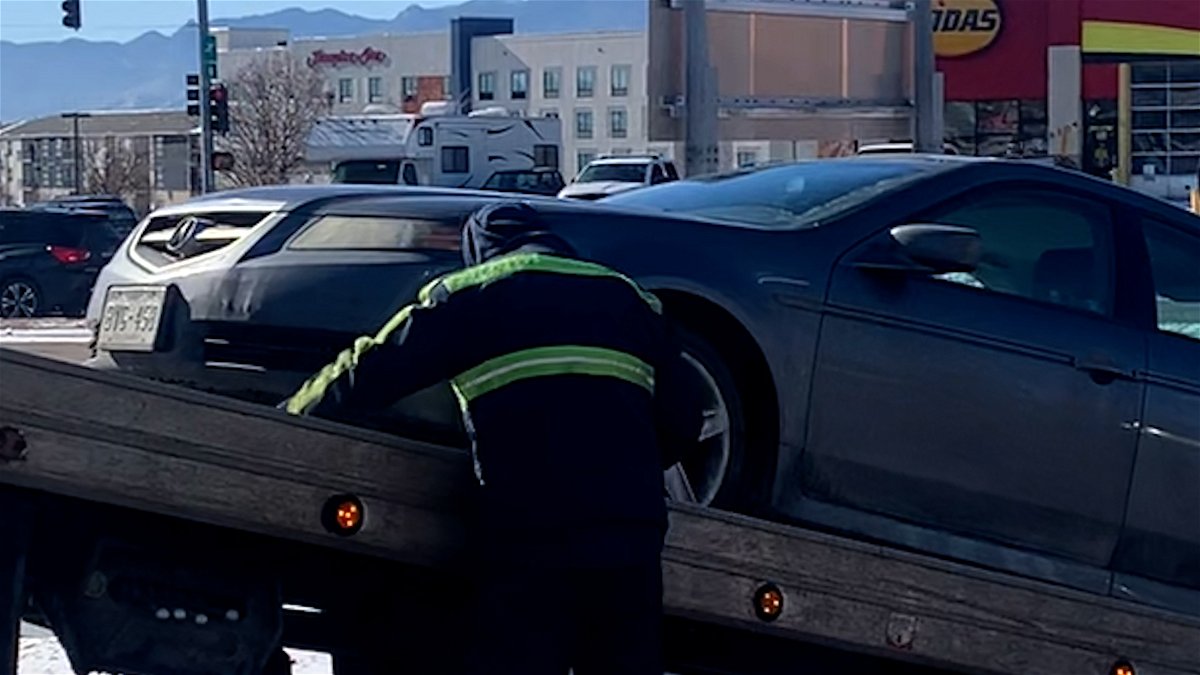13 Investigates Special Report: Towing companies face little oversight

EL PASO COUNTY, Colo. (KRDO) -- Drivers say they are struggling to repossess their vehicles for weeks, and in one case nine months, after being towed in El Paso County.
In August 2022, a new towing law went into effect in Colorado. The law gives Colorado vehicle owners new rights when the property is towed. The law primarily protects Coloradans whose cars are being towed without their consent.
For instance, when a car is parked illegally, a towing carrier must notify the vehicle owner before they start charging lot fees.
“Over the last few years there have been so many constituent complaints around towing,” Colorado State Rep. Naquetta Ricks told 13 Investigates. “The non-consensual tow law hasn’t been looked at for more than forty years.”
However, the new Colorado law does not focus on protections for vehicle owners who request a tow or roadside assistance through their auto insurance provider.
13 Investigates found drivers who were forced to file police reports and lawsuits just to get their property back from tow companies after requesting a tow.

When John Mortland’s Honda CRV slid into a curb on the north side of Colorado Springs in Nov. 2022, he said he did what he was supposed to do. Mortland filed a claim with his auto insurance provider, USAA.
Within an hour, a tow truck with SWFT Towing arrived at the site of the accident on the 700 block of Copper Center Parkway.
“The plan as I understood it is they would store it overnight and get it to Caliber Collision the next day, which was a Friday,” Mortland told 13 Investigates.
The following day, Caliber Collision, the auto repair shop, said the vehicle was a no-show.
Four days after the tow, Mortland says his auto insurance provider claimed there was no record of a tow ever taking place.
Six days following the tow, Mortland paid a visit to SWFT Towing.
“(There was) no record of the vehicle in their inventory at all,” Mortland said. “At that point, they had no idea where the car was.”
That same day, Mortland decided to file a theft report with the Colorado Springs Police Department. The following day, the vehicle arrived at Caliber Collision.
Billing records obtained by 13 Investigates show SWFT Towing billed Mortland’s insurance for 8 days of storage, which accounted for $400 of the $900 bill.
“It seemed like they were going to hold onto the vehicle as long as they could and charge storage fees,” Mortland said.
SWFT Towing told 13 Investigates that Mortland’s auto insurance provider knew where the vehicle was the whole time. The tow carrier claims they notified the auto insurance provider as soon as the tow took place.
USAA wouldn’t confirm SWFT Towing’s claim to 13 Investigates. However, the insurance company did provide a statement:
“USAA is well known for providing outstanding claims service to our members. At times, our service does not live up to the standards our members expect and deserve from us. When this happens, we work to make it right. This claim has been resolved…” - USAA
As for Mortland’s visit to SWFT Towing, the tow carrier said they couldn’t confirm the location of the vehicle to Mortland because the vehicle was in his wife’s name.
JENNIFER BOTTS
Jennifer Botts had to wait around nine months to get her GMC Acadia back from SWFT Towing.
Botts contacted her insurance provider Root Auto for roadside assistance back in Nov. 2021 while driving to the home she was staying at in Palmer Lake. When the tow truck arrived, Botts said the driver promised to deliver her vehicle to her home less than a few blocks away.
“Yeah no problem, I’ll bring it right to you once I get it what’s the address?” Botts recalled the tow truck driver telling her.
Instead, SWFT Towing took it 26 miles back to their vehicle lot.
SWFT Towing said the tow should’ve been classified as an accident, not roadside assistance. Because of this, the tow’s cost was a little more than $3,400. Botts said her insurance would not cover the cost, and it was an expense she couldn't afford.
When she lost her car, Botts says she lost her job because she no longer had reliable transportation.
Months after the tow, Botts filed a lawsuit in Colorado Springs small claims court.
Court records show SWFT Towing was ordered to return her GMC Acadia and pay more than $1,000 in damages.
During an appeal ruling, a district judge said SWFT Towing had no right to keep Botts’ car and should’ve returned it when she demanded it.
“According to her storytelling magic, the judge either felt bad for her and wasn’t educated (in towing law),” Eddie Lopez with SWFT Towing told 13 Investigates. “I’m just like everyone else. I have had my car towed I’ve had my car repoed in the past. I know how it hurts. I got in the business to help people.”
After the tow, Botts filed a complaint with the Colorado Public Utilities Commission (PUC), which regulates tow companies in the state.
In their response to her complaint, the PUC told Botts in an email in part “Unfortunately, the PUC does not have any jurisdiction with regard to your particular dispute.”
In regards to Botts’ complaint, the PUC told 13 Investigates they could not look into her complaint because they said the tow was consensual because she contacted her insurance provider.
Botts says she never agreed to have her vehicle towed to SWFT’s car lot.
She also says she went to law enforcement but was told it was a civil matter, not a criminal one.
“You have to go in circles just to get any kind of help,” Botts told 13 Investigates. “Everywhere I went. Everyone would say ‘Wow that’s a bizarre situation, I have no idea how to help you’.”
Despite holding an active permit through the PUC, SWFT Towing told 13 Investigates they don’t answer to vehicle owners or even state regulators from the PUC. In fact, the tow carrier’s owners said they only answer to auto insurance providers.
“We do not have to follow Colorado law 'cause we don’t do nonconsensual tows,” Lopez said.
However, the state says they do. In general, the PUC tells 13 Investigates if a towing carrier is transporting a vehicle that they don’t own themselves and are charging for their services, they are likely going to be subject to PUC oversight.
“Although more lightly regulated than other types of towing operations, carriers that conduct consensual tows are regulated by the PUC,” the PUC told 13 Investigates via email. “However, depending on the arrangement(s) and/or the specific work being done, there may be exceptions to this general standard. The PUC determines jurisdiction over particular types of towing operations on a case-by-case basis.”
The new towing law that went into effect in August allows the PUC to deny permits. Regulators can turn down a permit for a past towing-related conviction, or if the commission finds issuing one is against the public’s interest.
When it comes to nonconsensual towing companies, the PUC sets maximum towing rates, verifies towers hold liability insurance, ensures companies own and maintain proper equipment, and makes sure a carrier is permitted through the state. For consensual tows, the PUC says they do not set towing rates.
Tow carriers that break state law or permit rules can face a wide variety of civil penalties or fines. The standard fines range from $500 to $1,100.
According to the most recent PUC annual report, the number of state fines issued against tow companies dropped by 93% from 2018 to 2021. In 2017, regulators collected more than $53 thousand in fines. Just four years later, the number dropped to $0.
In their report, the commission attributes reduced enforcement to staffing shortages.
“There appears to be less oversight of this industry,” Adah Rodriguez with the Better Business Bureau (BBB) of Southern Colorado told 13 Investigates.
Rodriguez said consumers often file complaints against tow carriers through the BBB, more so than a majority of other businesses.
Only three out of the more than 80 towing carriers in El Paso County are accredited with the BBB. To become accredited with the BBB a business must meet the criteria of guidelines including honestly representing services, abiding by agreements, and being transparent about policies.
Rodriguez attributes the low number of accredited towing carriers to some businesses' inability to meet their standards, and others don’t bother applying for the accreditation.
She explained it’s the BBB of Southern Colorado’s position that towing permit standards in Colorado are too low.
"The challenge is even though a towing company might hold all of the necessary requirements to operate does not mean they will have ethical business practices,” Rodriguez told 13 Investigates.
13 Investigates asked Root Auto Insurance and USAA what standards they hold their tow companies to before contracting with them.
Root Auto never responded.
USAA said they operate through a third party when it comes to providing tow services to their insurance holders. However, USAA did not provide specifics regarding their own standards for tow services.
“…We will continue to evaluate our processes and the vendors used to provide roadside assistance to our members.” - USAA.
13 Investigates asked State Rep. Naquetta Ricks if she will consider a similar towing law for regulating consensual tows.
"If there are issues I think it's conversations like this that open up the idea of looking into this matter of consensual tows between auto insurance and tow truck industry. To see if there is something that needs to be done. If laws need to be strengthened."
